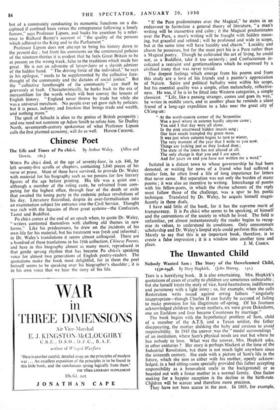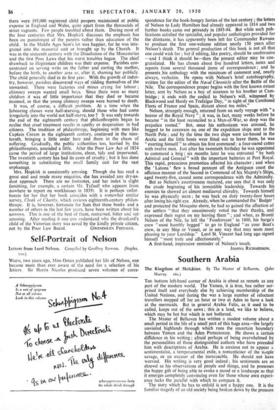The Unwanted Child
THIS is a horrifying book. It is also entertaining. Mrs. Hopkirk's quotations of cases of cruelty to children are sometimes unbearable ; but she herself treats the story of vice, hard-heartedness, indifference and parsimony with a light irony ; as, for example, when she calls Restoration writs issued against erring fathers " singularly inappropriate—though Charles II can hardly be accused of failing to make provision for his illegitimate off-spring. Of his fourteen acknowledged children by seven mothers, six were given Dukedoms, one an Earldom and four became Countesses by marriage."
The book begins with, the hypothetical problem of Sam, child of a member of the A.T.S. and a Texan soldier, the father disappearing, the mother disliking the baby and anxious to avoid responsibility. In 1945 the answer was the " model surroundings " of an institution, where Sam's physical needs are met but where he has nobody to love. What was the answer, Mrs. Hopkirk asks, in other centuries ? Her story is perhaps blackest at the time of the Industrial Revolution, but there is not much light anywhere since the sixteenth century. She ends with a picture of Sam's life in the future, which she sees as either with his mother, openly acknow- ledged, in a bed sitting-room specially provided (his father accepting responsibility as a benevolent uncle in the background) or as boarded out with a foster mother in a normal family. One factor making for a happier reception is the decline in the birth-rate. Children will be scarcer and therefore more precious.
They have not been scarce in the past. In 1803, for example,
there were 195,000 registered child paupers maintained at public expense in England and Wales, quite apart from the thousands of street vagrants. Few people troubled about them. During most of the four centuries that Mrs. Hopkirk discusses the emphasis has been on punishment of the parents rather than education of the child. In the Middle Ages Sam's lot was happier, for he was inte- grated into the manorial unit or brought up by the Church. It was in the sixteenth century with the Dissolution of the Monasteries and the first Poor Laws that his worst troubles began. The chief drawback to illegitimate children was their expense. Parishes con- centrated on serving writs on the father and carting the mother, before the birth, to another area or, after it, shaming her publicly. The child generally died in its first year. With the growth of indus- try, however, parishes discovered ways of ridding themselves of the unwanted. There were factories and mines crying for labour ; chimney sweeps wanted small boys. Since there were so many children it was of little importance that they died or became maimed, of that the young chimney sweeps were burned to death. It was, of course, a difficult problem. At a time when the labouring classes were half-starving, should those who had come irregularly into the world not half-starve, too ? It was only towards the end of the eighteenth century that philanthropists began to realise that cruel treatment results in apathy or desperation in bad citizens. The tradition of philanthropy, beginning with men like Captain Coram in the eighteenth century, continued in the nine- teenth, bringing a little order here and there in the chaos of suffering. Gradually, the public authorities too, harried by the philanthropists, amended a little. After the Poor Law Act of 1834 came the period of. large institutions, clean, tidy and impersonal. The twentieth century has had its cases of cruelty ; but it has done something in substituting the small family unit for the vast orphanage. Mrs. Hopkirk is consistently amusing. Though she has read a great deal and made many enquiries, she has avoided any dry-as- dust approach. There are no footnotes, and her index is slight (omitting, for example, a certain Mr. Tufnell who appears from nowhere to report on workhouses in 1839). It is perhaps unfor- tunate for her that her book coincides with a somewhat similar survey, Cloak of Charily, which reviews eighteenth-century philan- thropy. It is, however, fortunate for Sam that these books and a number of others in the last few years, have been written about his sorrows. This is one of the best of them, restrained, bitter and yet- amusing. After reading it one can understand why the drunkard's child of the Victorian.story was saved by the kindly private citizen,



































 Previous page
Previous page